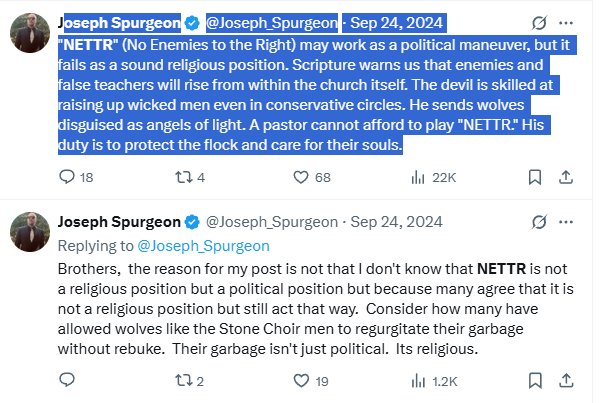Thank you again, brothers, for your responses.
Let me start by saying we’re all in agreement that the core truths of the gospel must remain central and upheld at all costs. There are endless ways we can be tempted to drift from those truths. But the gospel is not only good news for eternity—it shapes how we live here and now.
There is always tension between living in light of eternity and exercising godly affections for the people, place, and time God has placed us in. It’s easy to get out of balance. I do think many on social media get the balance wrong. But there’s a reason for that.
While there’s certainly a temptation to overemphasize temporal concerns or drift into speculation, it’s often a reaction to the opposite error: silence in the face of real evil—hiding behind the phrase “just preach the gospel.”
Take race, for example. In our nation, the vilification of white people is real. Our leaders have flooded the West with immigrants who do not share our culture, in what often seems like an intentional effort to erase that culture. Black criminals are made into martyrs, while our fathers have their statues torn down and their legacy defamed.
And yet, when faithful men speak up, they’re labeled racist—not just by the world, but by the church. Most pastors have no real answer besides, “Just focus on the gospel, brother.” But that rings hollow. It’s like telling the poor man in James, “Be warmed and filled,” while doing nothing to address his need.
If we’re going to love our neighbors, honor our fathers and mothers, and protect our households, we have to speak to the issues shaping our time. And when men do speak, they’re not met with careful biblical correction—but with broad accusations and straw men. What we need is not more warnings, but better arguments.
And so, while King David fiddles around on the throne, ashamed of his past sins, Absaloms arise—men who at least acknowledge the problems and speak to them. And yes, I’ve warned about the danger of Absaloms. But not every man who raises these issues is one.
What we’re seeing is a desire among men to recover historic Christian and Reformed political theology in order to deal with these real-world problems. Wolfe’s book is one such attempt. Regarding the so-called “speculation” in it: I’m not convinced it’s speculative to say that, had Adam not sinned, human society would still have included households, tribes, and civil governments. Adam was the head of the first household, the first nation, the first society. That’s not a stretch—it follows directly from creation and dominion.
But even if someone disagrees on that point, Wolfe himself has said that the case for Christian nationalism doesn’t depend on it. The broader arguments in his book can be found in works like The Messiah the Prince by William Symington, The Church of Christ by James Bannerman, and Calvin’s Institutes. This isn’t novelty—it’s retrieval.
When I hear critiques of Christian nationalism, I often don’t hear the Reformers being engaged. I hear modern assumptions, shaped more by American individualism than Reformed theology. Or I hear vague concerns about balance, obsession, or tone. And while those concerns may sometimes be valid, simply engaging an idea or talking about politics is not the same as being obsessed with it.
Responding to Pastor Matt:
“But the problem with this is that by using NETTR Christians are then fundamentally yoked to The Right. This is the core of our disagreement. I as a Christian and a young minister of the Gospel do not want to be yoked to any political party. No thanks. Period. The end.”
Let me be clear: I’m not even much of a proponent of NETTR. I’ve publicly criticized it for many of the same reasons Pastor Tim gave in the podcast. The popular usage of NETTR has overtaken any more careful formulation.
That said, I think there’s still something worth considering in the original idea—namely, that we shouldn’t use leftist tactics or categories when critiquing those on our side. And while NETTR is a political principle, I think there’s a broader point we can apply: you don’t go to the New York Times to attack your own denomination, like Russell Moore did. It’s a matter of basic loyalty and wisdom.
Now, if by saying you don’t want to be yoked to a political party, you mean your loyalty to Christ is supreme over any party or tribe—I completely agree. Christ comes before everything. But we are all yoked to subordinate loyalties: to our families, our churches, our communities, and yes, at times, to political or cultural allies.
Most of us are technically affiliated with a party by voter registration. That doesn’t mean we place our ultimate hope there. But it does mean that we have to think carefully about how we treat those with whom we have some shared cause.
In Christ,
Joseph

